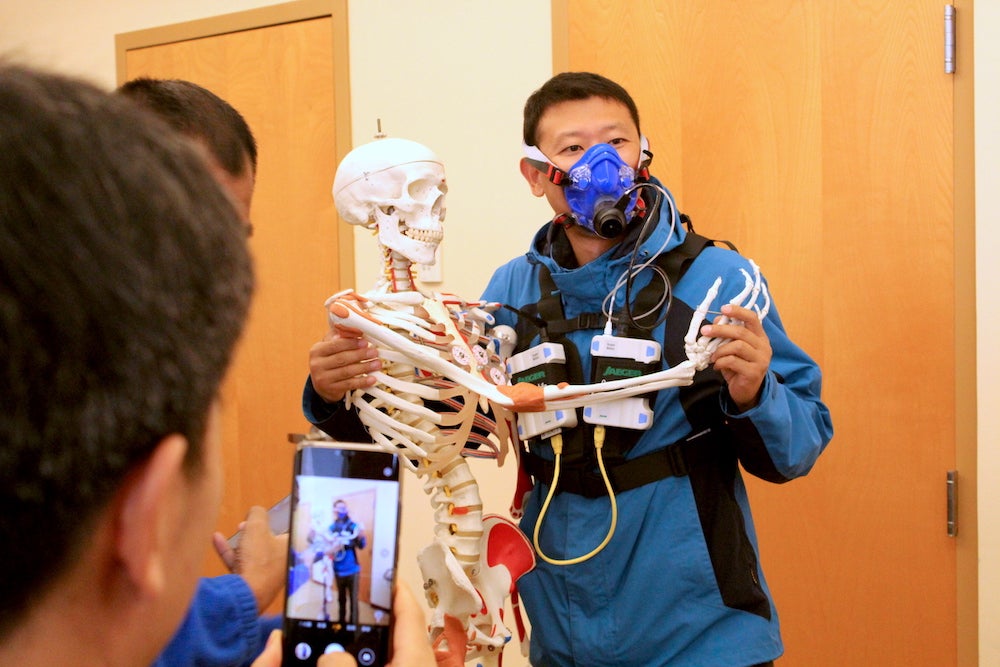Researchers, professors and sports scientists share information to fuel high-performance athletes
Olympic athletes from China may have a leg up on some of their opponents — and an equal footing with the U.S. team — thanks to a two-week visit to URI from members of the Chinese governing body of sport.
The URI College of Health Sciences hosted coaches, trainers, physical therapists and researchers from the Chinese Olympic Delegation to share sports science information and demonstrate the advanced training labs housed in Independence Square. The delegation toured such facilities as the human performance lab, health fitness lab and motion analysis lab. The visitors also took part in lectures and discussions hosted by professors and researchers from URI and other universities.
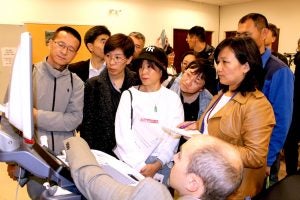 “The governing body of sport in China has been taking these excursions to see what research is going on and learn new trends in other regions of the world,” said kinesiology Assistant Professor Jake Earp, noting the delegation had also spent two weeks with a university in Michigan. “The overall goal is to strengthen sport in China.”
“The governing body of sport in China has been taking these excursions to see what research is going on and learn new trends in other regions of the world,” said kinesiology Assistant Professor Jake Earp, noting the delegation had also spent two weeks with a university in Michigan. “The overall goal is to strengthen sport in China.”
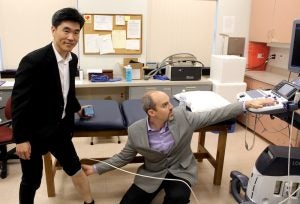 The program also aims to strengthen sport locally, as the delegation and URI researchers learned from each other on this and a previous visit to URI about two years ago, according to Dean Gary Liguori, who lectured on wearable technology, especially as it relates to health and fitness.
The program also aims to strengthen sport locally, as the delegation and URI researchers learned from each other on this and a previous visit to URI about two years ago, according to Dean Gary Liguori, who lectured on wearable technology, especially as it relates to health and fitness.
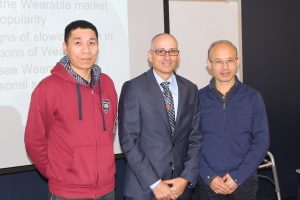 “They are coming in with tremendous experience and expertise; it’s a great opportunity to build relationships,” Liguori said. “We’re finding out from each other what’s new in sports research, how we can figure things out differently. It’s all about what we can do to help athletes perform better. Hopefully, they can come back on a semi-regular basis.”
“They are coming in with tremendous experience and expertise; it’s a great opportunity to build relationships,” Liguori said. “We’re finding out from each other what’s new in sports research, how we can figure things out differently. It’s all about what we can do to help athletes perform better. Hopefully, they can come back on a semi-regular basis.”
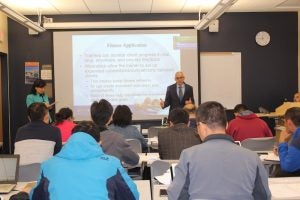 The Chinese delegation visited the university through Oct. 24. Presentations made before the delegation include:
The Chinese delegation visited the university through Oct. 24. Presentations made before the delegation include:
- “Optimizing screening and preventative training programs for overuse injuries in athletes,” by Dr. Adam Tenforde.
- “Running factors leading to overuse injuries in athletes and gait retraining” by Assistant Professor of Physical Therapy at Springfield College Erin Fuller.
- “Developing strength, power and speed independent of muscle mass” by Earp.
- “Current concepts in strength and conditioning, recovery and regeneration for hockey players” by Mike Macchioni, CSCS Title: sports performance coach of the Boston Bruins and director of NorthEast Sports Training & Rehabilitation.
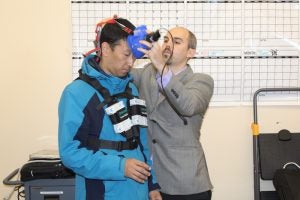 “Accentuated eccentric loading for athlete development” by Chris Taber, assistant professor of exercise science at Sacred Heart University.
“Accentuated eccentric loading for athlete development” by Chris Taber, assistant professor of exercise science at Sacred Heart University.- “Wearable technology trends” by Ligouri.
- “Best practices for optimal health, well-being, and performance of athletes at pre, during, and post season” by Florida State University Professor Tim Baghurst.
- “Sports Nutrition: Fueling the high-performance athlete” by Nancy Clark, sports nutrition counselor and author.
- “Monitoring athlete training & physical status using physical, psychological and biological biomarkers” by Robert Huggins, President of research & athlete performance and safety at Korey Stringer Institute.
- “Developing a strength & conditioning philosophy” by Brian Thompson, professor of exercise science and sports studies at Springfield College.
- “Environmental concerns for training and competition” by Rebecca Stearns, chief operating officer at the Korey String Institute and assistant professor in residence at the University of Connecticut.
- “Coaching the digital athlete” by Shelby Downing, human performance director at Carrabassett Valley Academy.

